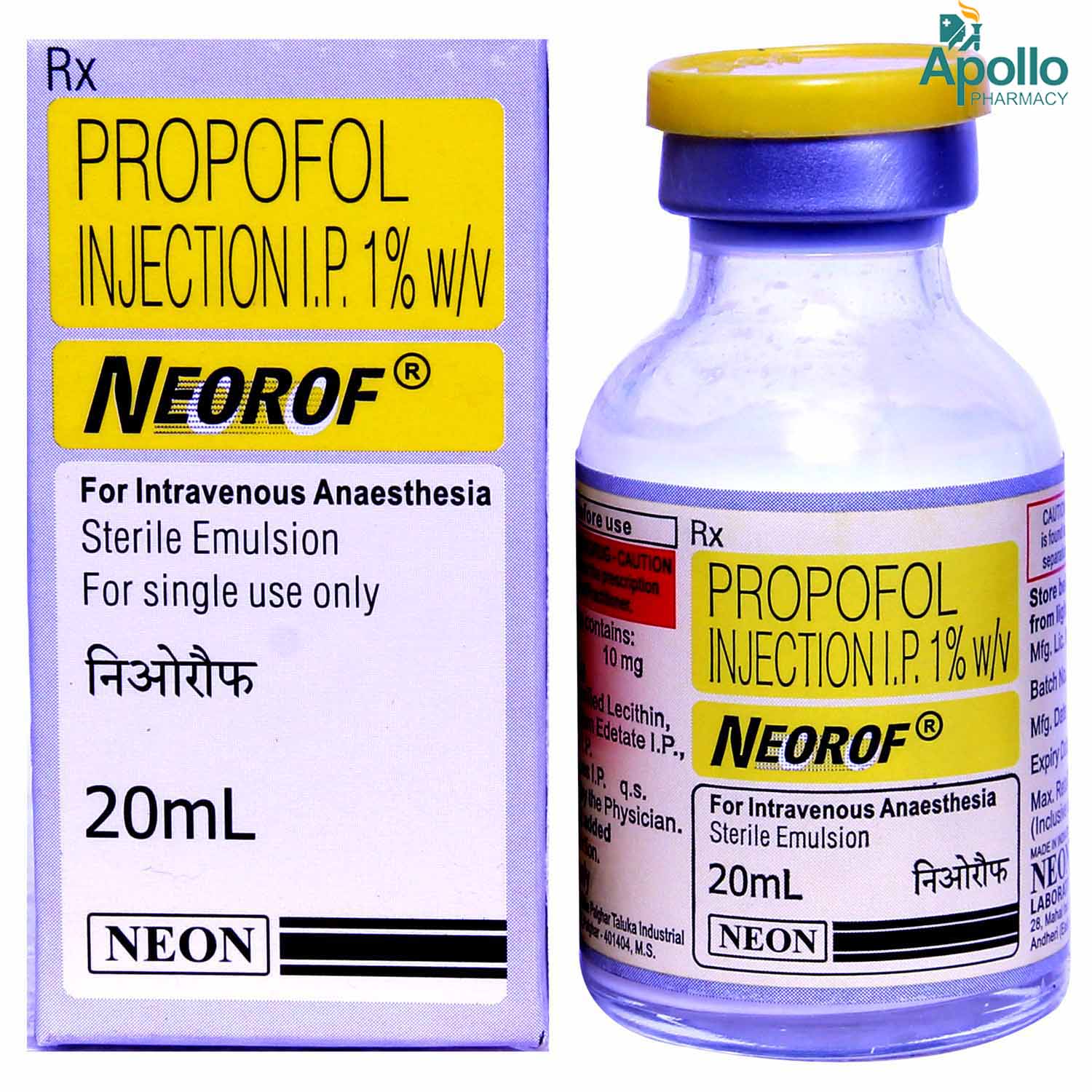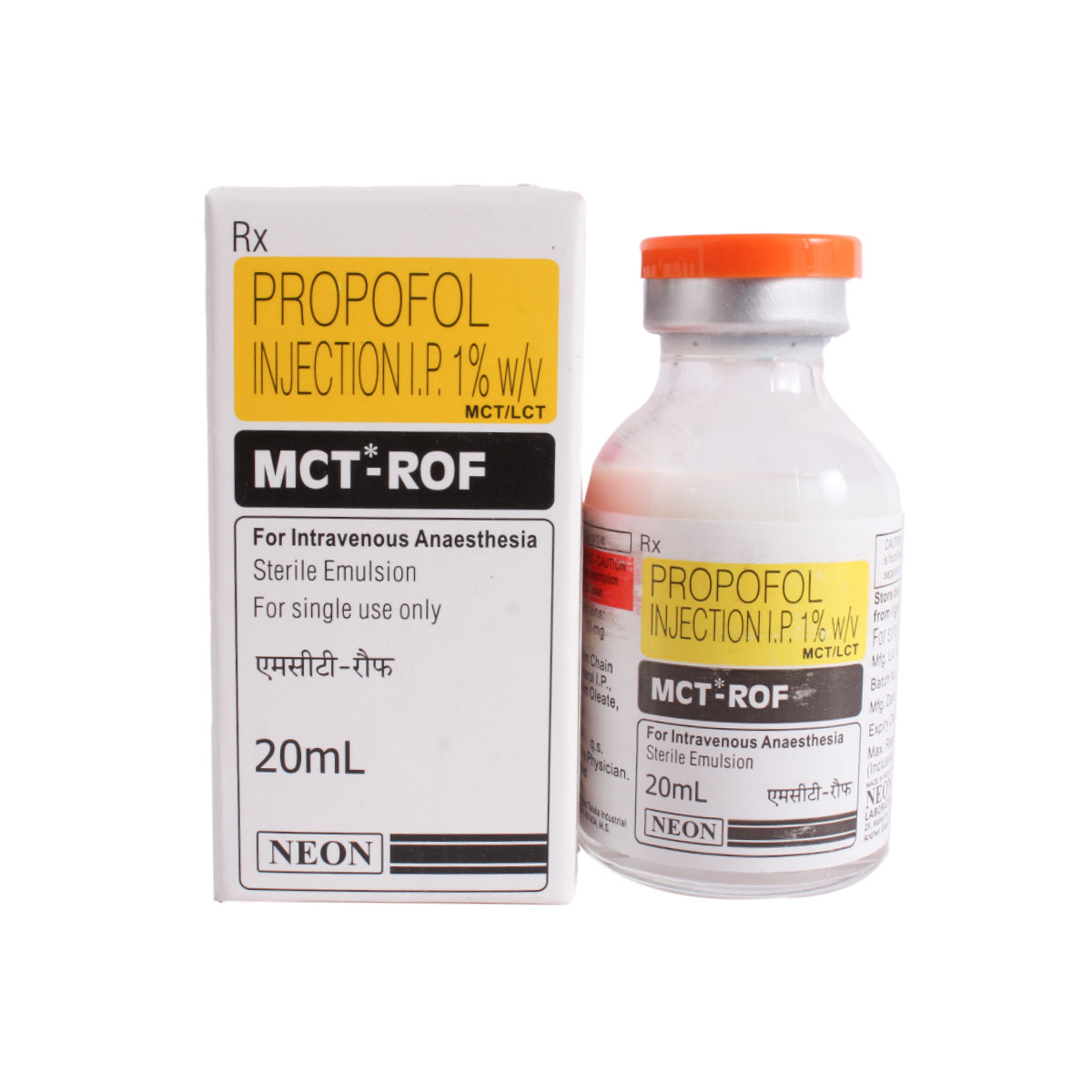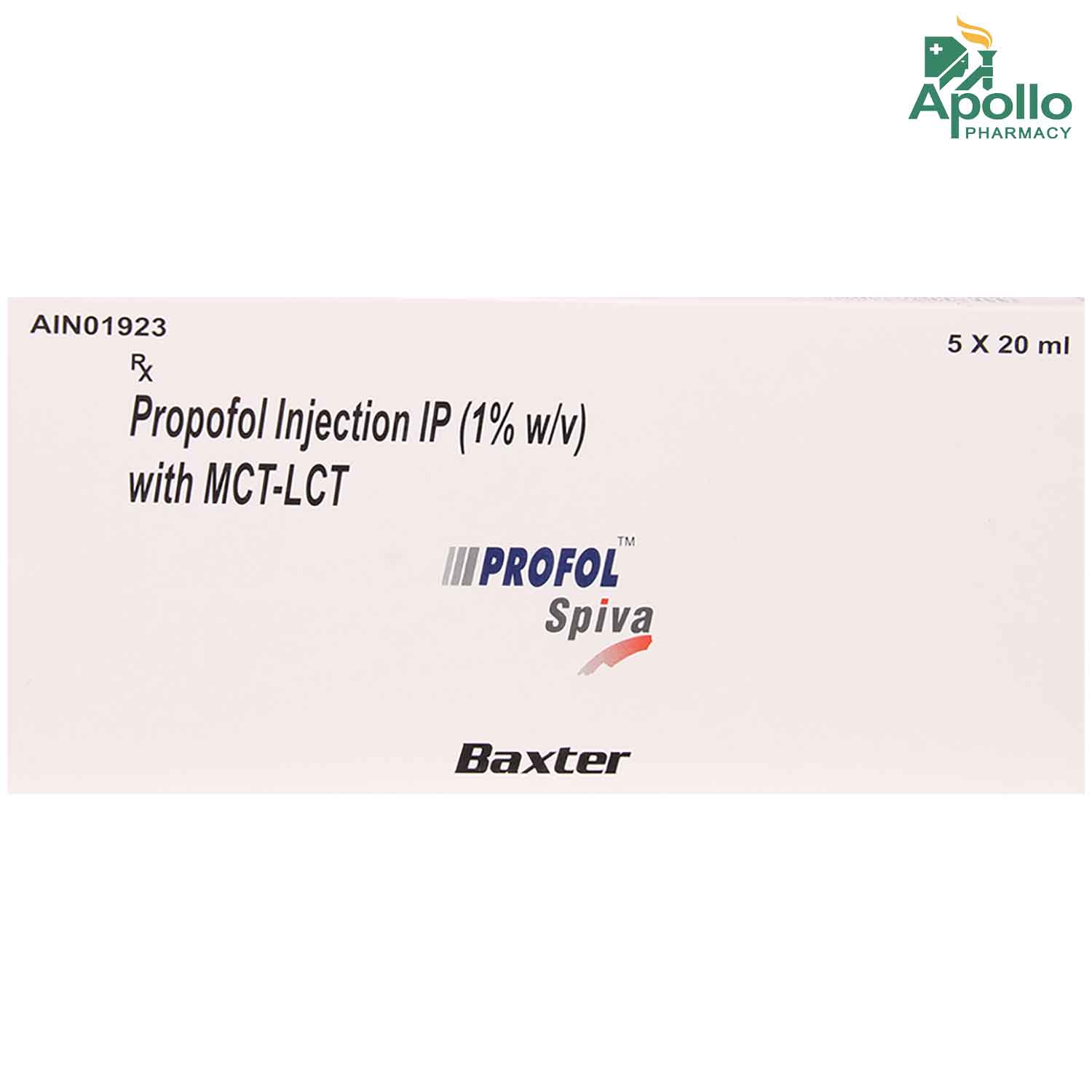Profol Injection 1% - 50ml
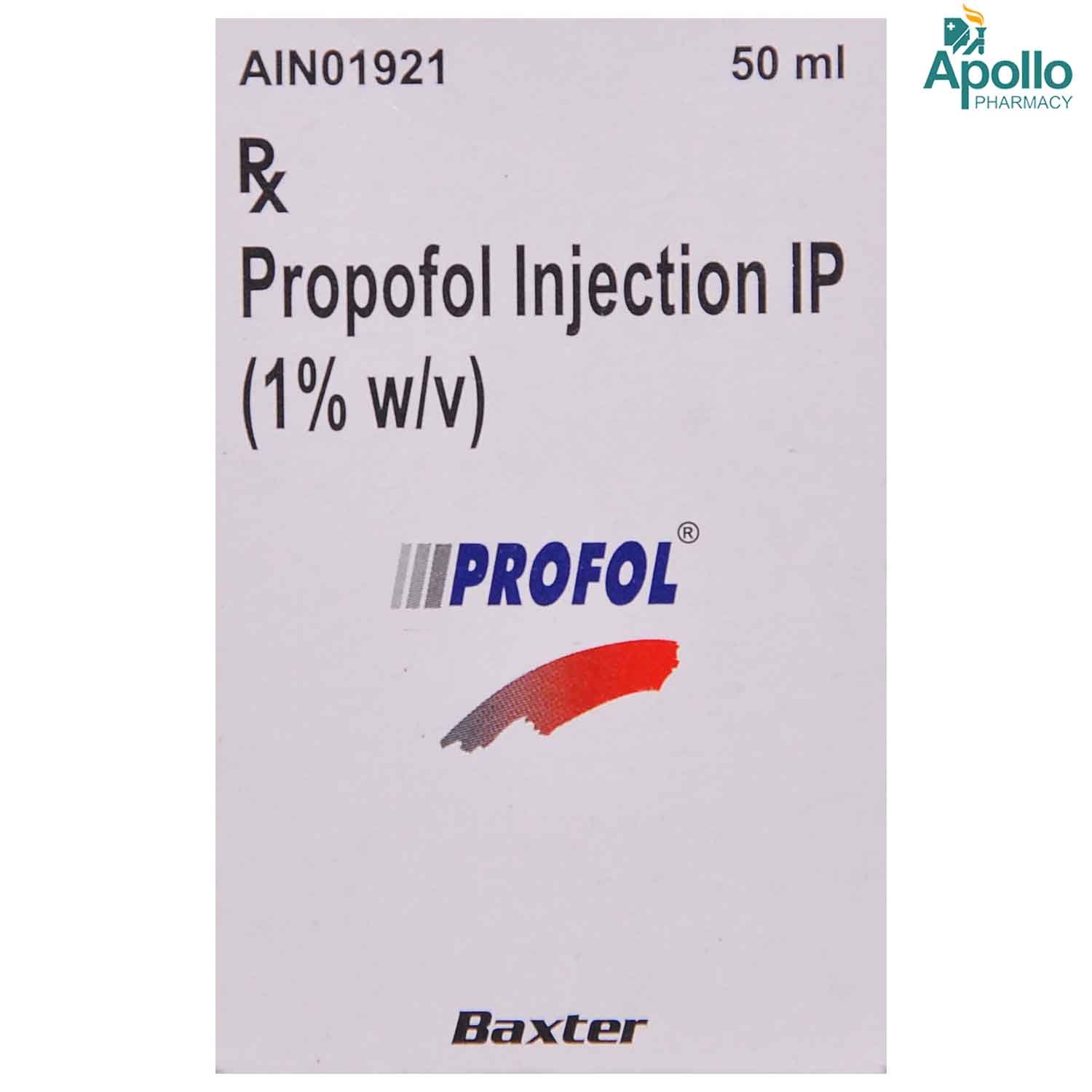
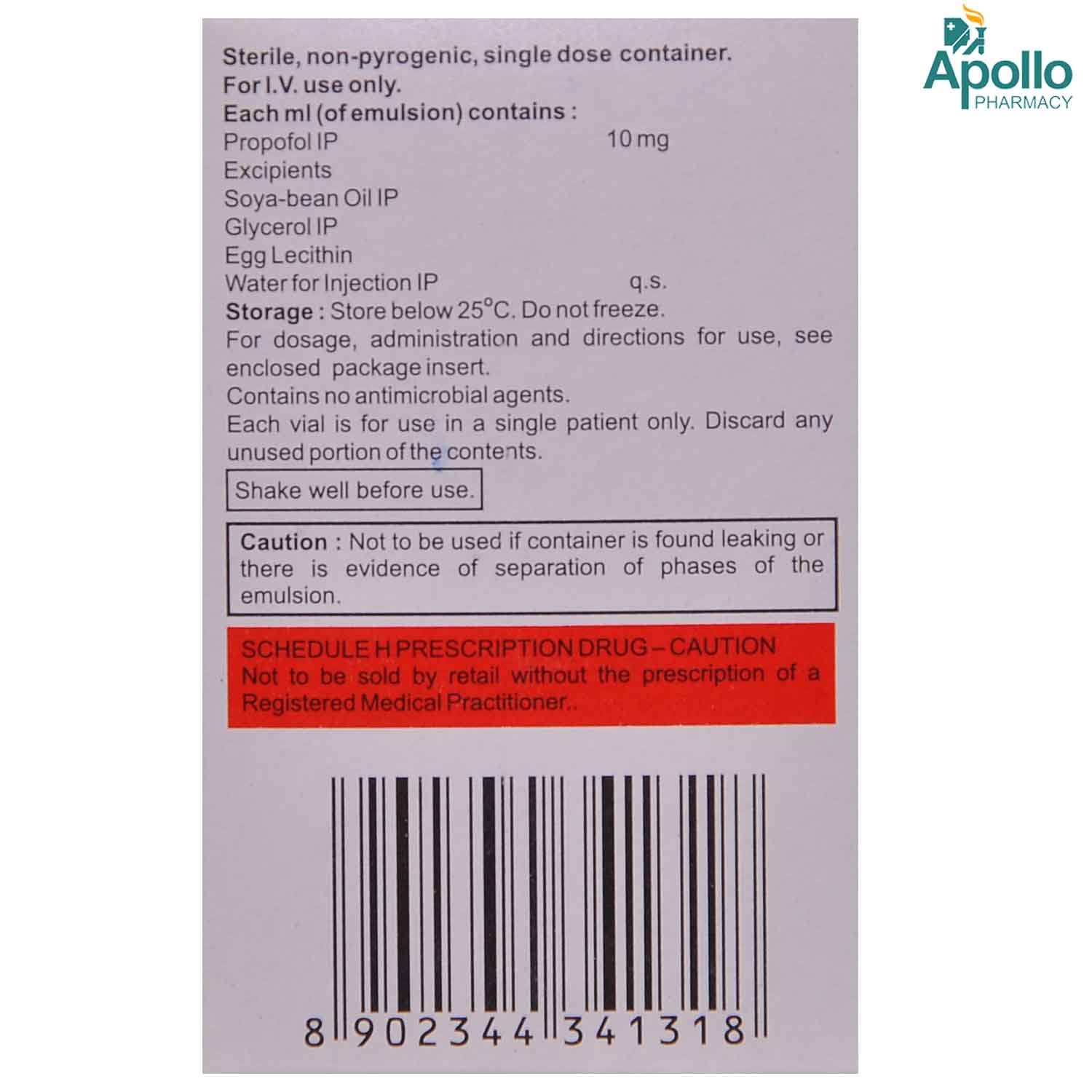
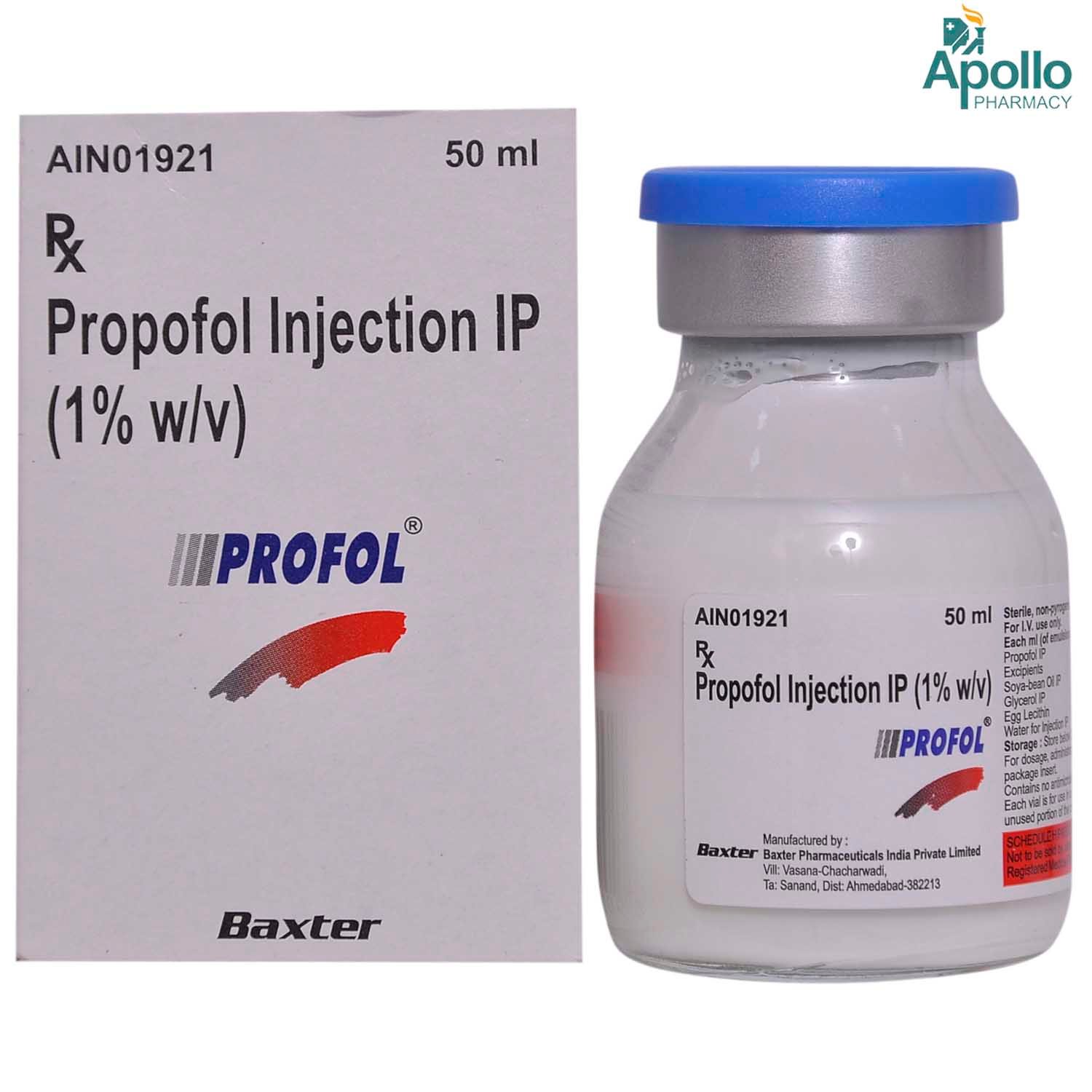



MRP ₹449
(Inclusive of all Taxes)
₹67.3 Cashback (15%)
Provide Delivery Location
Online payment accepted
 Prescription drug
Prescription drugWhats That
Composition :
Manufacturer/Marketer :
Consume Type :
Expires on or after :
Return Policy :
About Profol Injection 1% -
Profol Injection 1% - belongs to a class of drugs known as 'general anesthetic', primarily used in giving anesthesia for major surgical procedures. It is given as induction therapy before surgery to sedate the patient. General Anaesthesia is a medication given before surgery to put you to sleep so that you do not feel the pain as you are unconscious.
Profol Injection 1% - contains Propofol, which is used as an anesthetic for surgeries so that procedure is carried out without pain and distress. It works by causing loss of consciousness, which is reversible. It generally slows down the brain and central nervous system, which is the conscious center.
Take Profol Injection 1% - as prescribed by your doctor. You are advised to take Profol Injection 1% - for as long as your doctor has prescribed it for you, depending upon your medical condition. In some cases, you may experience dizziness, hypotension (low blood pressure), nausea, headache, vomiting, local site pain, changes in your breathing pattern, slow heartbeat. Most of these side effects of Profol Injection 1% - do not require medical attention and gradually resolve over time. However, if the side effects are persistent, reach out to your doctor.
Do not take Profol Injection 1% - if you are allergic to Profol Injection 1% - or any of its ingredients. Profol Injection 1% - should always be given by a doctor or a trained professional as over-dose can cause excessive sedation, which can be fatal. Do not drive a car or operate any machinery as Profol Injection 1% - affects alertness. If you are pregnant, planning got conceive or are breastfeeding, Profol Injection 1% - should be taken only after informing your doctor.
Uses of Profol Injection 1% -
Directions for Use
Key Benefits
Profol Injection 1% - belongs to a class of drugs known as 'general anesthetic,' containing Propofol, primarily used in giving anesthesia for major surgical procedures. It allows the procedures to be carried out without pain and distress. It works by causing loss of consciousness, which is reversible. It generally slows down the brain and central nervous system, which is the conscious center. It is also used in people on a ventilator or who need critical care to sedate the patient.
Storage
Drug Warnings
Do not take Profol Injection 1% - if you are allergic to Profol Injection 1% - or any of its ingredients. Profol Injection 1% - should always be administered by a doctor or a trained professional as over-dose can cause excessive sedation which can be fatal. Do not drive or operate any machinery as Profol Injection 1% - affects alertness. If you are pregnant, planning got conceive or are breastfeeding, Profol Injection 1% - should be taken only after informing your doctor. Maintain a gap of 24 hours after using Profol Injection 1% - and breastfeeding. The doctor will constantly monitor your blood pressure, oxygen level, breathing pattern and kidney function while the surgery goes on.
Diet & Lifestyle Advise
- Do not consume alcohol while taking Profol Injection 1% - as it might increase the sedation.
- Eat a low-calorie diet generally home-cooked for a speedy recovery.
- Avoid junk food, oily and spicy food as you have undergone surgery.
- Also, in case of sleep disturbances, try to spend time with family, which will change your mood and help you to fall asleep.
- Limit the screen time as it also alters your sleep cycle.
Side Effects of Profol Injection 1% -
- Hypotension (low blood pressure)
- Nausea
- Headache
- Vomiting
- Dizziness
- Local site pain
- Changes in your breathing pattern
- Slow heartbeat
Habit Forming
Therapeutic Class
All Substitutes & Brand Comparisons
RX
Not for online saleFresofol 1% Injection 20 ml
Fresenius Kabi India Pvt Ltd
₹136.5
(₹6.01/ 1ml)
25% CHEAPERRX
Not for online saleNeorof Injection 20 ml
Neon Laboratories Ltd
₹136
(₹6.12/ 1ml)
24% CHEAPERRX
Not for online saleMct-Rof 20ml Injection
Neon Laboratories Ltd
₹136
(₹6.12/ 1ml)
24% CHEAPER
Product Substitutes
FAQs
Drug-Drug Interactions Checker List
- RIFAMPICIN
- LORAZEPAM
- DIAZEPAM
- DILTIAZEM
- VERAPAMIL
- CIPROFLOXACIN
- FUROSEMIDE
- MIDAZOLAM
- ALPRAZOLAM
Special Advise
- Do not self administer Profol Injection 1% -. It should be done by a doctor only.
- Constant monitoring of breathing pattern, blood pressure, oxygen levels, kidney function is required.
Disease/Condition Glossary
General Anaesthesia: It is a medication given before surgery to put you to sleep so that you do not feel the pain as you are unconscious. It is more than sleep as the brain does not respond to the pain signals. A trained person who is specialized in anaesthesia generally gives the anesthesia as an intravenous infusion or injection form.

Have a query?
Buy best Anaesthetics products by
Neon Laboratories Ltd
Themis Pharmaceutical Ltd
Troikaa Pharmaceuticals Ltd
Samarth Life Sciences Pvt Ltd
Abbott India Ltd
Astra Zeneca Pharma India Ltd
Baxter India Pvt Ltd
Core Claris Lifesciences Ltd
Celon Laboratories Pvt Ltd
Ajanta Pharma Ltd
Miracalus Pharma Pvt Ltd
Torrent Pharmaceuticals Ltd
Zydus Cadila
AP Pharmaceutical
Fresenius Kabi India Pvt Ltd
Galpha Laboratories Ltd
Indoco Remedies Ltd
Anglo French Drugs & Industries Ltd
B Braun Melsungen AG
Cadila Pharmaceuticals Ltd
Claris Lifesciences Ltd
Dr Reddy's Laboratories Ltd
Elder Pharmaceuticals Ltd
Fortel Life Sciences
Hetero Healthcare Pvt Ltd
Icpa Health Products Ltd
Pure Derma Healthcare Pvt Ltd
Salve Pharmaceuticals Pvt Ltd
Sunways (India) Pvt Ltd
VARENYAM HEALTHCARE PVT LTD
Wockhardt Ltd
Zydus Healthcare Ltd
6Ipain Healthcare Pvt Ltd
Admac Lifesciences(Oncology)
Aesmira Lifesciences Pvt Ltd
Albatross Healthcare Pvt Ltd
Amwill Healthcare Pvt Ltd
Anchal Life Science Pvt Ltd
Atopic laboratories Pvt Ltd
Biovenice Criticure
Cellgen Biopharma
Cipla Ltd
Delvin Formulations (P) Ltd
Entod Pharmaceuticals Ltd
Ethinext Pharma
Foremost Marketing Pvt Ltd
Fusion Health Care Pvt Ltd
German Remedies Ltd
Global Dent Aids Pvt Ltd
Greycells Lifesciences Pvt Ltd
Himeros Pharmaceuticals Pvt Ltd
Ici India Ltd
Icpa Lab
Ikon Remedies Pvt Ltd
Intas Pharmaceuticals Ltd
Kopran Laboratories Ltd
Kshipra Health Solutions
Leeford Healthcare Ltd
MSP Pharmaceuticals
Medimarck Biotech
Modi Mundipharma Pvt Ltd
Mylan Pharmaceuticals Pvt Ltd
Optima Healthcare Solutions
Pericles Pharma
Pharmadent Remedies Pvt Ltd
Piramal Enterprises Ltd
Pristine Pearl Pharma Pvt Ltd
Questus Pharma Pvt Ltd
Ranbaxy Laboratories Ltd
Rusan Healthcare Pvt Ltd
Scott Edil Pharmacia Ltd
Skinocean Pharmaceuticals
Themis Chemicals Ltd
Themis Medicare Ltd
Ultra Drugs Pvt Ltd
Vhb Life Sciences Inc
Zee Laboratories Pvt Ltd
Alcohol
Safe if prescribed
Profol Injection 1% - can affect alertness if taken along with alcohol. So, the consumption of alcohol should be avoided as it might further reduce alertness.
Pregnancy
Consult your doctor
Profol Injection 1% - is not recommended in the last trimester of the pregnancy as it may affect the baby's brain's growth.
Breast Feeding
Consult your doctor
Profol Injection 1% - is known to pass through the breastmilk. So, it is not advised to take Profol Injection 1% - during breastfeeding. Consult your doctor for further advice.
Driving
Safe if prescribed
Profol Injection 1% - can affect alertness and coordination as it is known to cause drowsiness. So, operating machinery which requires concentration should be avoided.
Liver
Consult your doctor
Profol Injection 1% - to be taken with caution, especially if you have had a history of liver disease. Your doctor will have to change the dosage depending on your medical condition and your reaction to treatment.
Kidney
Consult your doctor
Profol Injection 1% - to be taken with caution, especially if you have had a history of kidney disease. Your doctor will have to change the dosage depending on your medical condition and your reaction to treatment.
Children
Safe if prescribed
Profol Injection 1% - is not recommended for children below the age of 3 years. For children aged above three, take in dose and duration advised by a doctor.



